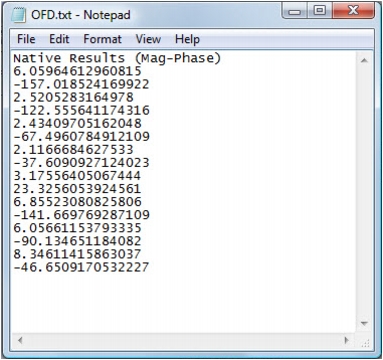Example 5 – Acquiring Binary Data, Arbitrary Block
Example 5 – Code Listing
using System;
using System.Text;
using System.IO;
using NationalInstruments.VisaNS;
using System.Threading;
namespace Example5
{
class Program
{
static void Main(string[] args)
{
//VXI-11 Connection string
string sAddress = "TCPIP0::10.0.1.196::INSTR";
//The VNA uses a message based session
MessageBasedSession mbSession = null;
//But we'll just open a generic Session first
Session mySession = null;
double[] responseArray = null;
try
{
//open a Session to the VNA
mySession = ResourceManager.GetLocalManager().Open(sAddress);
//cast this to a message based session
mbSession = (MessageBasedSession)mySession;
//Timeout to 1 second (1000 ms)
mbSession.Timeout = 1000;
mbSession.TerminationCharacter = 0x0a;
mbSession.TerminationCharacterEnabled = false;
mbSession.SendEndEnabled = true;
//We'll limit the number of data points to keep buffer small
mbSession.DefaultBufferSize = 5000;
testClear(mbSession);
//Set the Language to NATIVE
//This code group sets the sweep to 8 points,
//then makes trace2 active, sets to Mag-Phase, does a trigger sweep,
//and waits for sweep to finish.
//Then it sets output format to 64 bit binary and
//least significant bit first (little endian) and
//asks for Final Data.
mbSession.Write("LANG NATIVE\n");
mbSession.Write("CH2;MPH;\n");
mbSession.Write(":SENSE:SWEEP:POINTS 8\n");
mbSession.Write("TRS;WFS;HLD\n");
mbSession.Write("LSB;FMB;OFD\n");
responseArray = testStatus_ReadArbBinaryDouble(mbSession);
//responseArray[] will hold the 16 readings from the VNA.
//They will be mag1, phase1, mag2, phase2, etc.
//Send results to a file
StreamWriter output = new StreamWriter("OFD.txt");
output.WriteLine("Native Results (Mag-Phase)");
foreach (double d in responseArray)
output.WriteLine(d);
output.Close();
mbSession.Write("RTL\n");
mbSession.Dispose();
}
catch (VisaException v_exp)
{
Console.WriteLine("Visa caught an error!!");
Console.WriteLine(v_exp.Message);
}
catch (Exception exp)
{
Console.WriteLine("Something didn't work!!");
Console.WriteLine(exp.Message);
}
}
private static double[] testStatus_ReadArbBinaryDouble(MessageBasedSession mbSession)
{
//These are the bits to check
int b2 = 4, //Error Queue is not empty
b4 = 16; //MAV = Message Available
byte[] responsebytes = null;
double[] replybytes = null;
string errorString = null;
//Read the Status Byte of Service Request Status Register
StatusByteFlags sb = mbSession.ReadStatusByte();
while (((int)sb & (b2 + b4)) == 0)
{
Thread.Sleep(10);
sb = mbSession.ReadStatusByte();
}
if (((int)sb & b2) != 0)
{
errorString = mbSession.Query("OGE\n");
Console.WriteLine("Error Queue: " + errorString);
}
else if (((int)sb & b4) != 0)
{
//Here we use the ReadByteArray() function to read the
//binary data into a byte array.
//Then we convert the bytes to doubles.
responsebytes = mbSession.ReadByteArray();
replybytes = arbToDouble(responsebytes);
}
mbSession.Write("*CLS\n");
return replybytes;
}
private static void testClear(MessageBasedSession mbSession)
{
mbSession.Write("*CLS\n");
}
//Here we convert Arb Block Binary Data to a double array
//This function reads the arbitrary block header and then converts
//the byte array into a double array. Every 8 bytes is converted to
//a double. We use a MemoryStream and BinaryReader to do the conversion.
private static double[] arbToDouble(byte[] responseBytes)
{
int i = 0;
double[] dReturn = null;
//Arbitrary Block should start with a #
if (responseBytes[i++] == '#')
{
//Header is ASCII, get 2nd byte and convert to int
string sCount = ASCIIEncoding.ASCII.GetString(responseBytes, i++, 1);
int count1 = int.Parse(sCount);
//now read the bytecount string and convert to int
string sBytes = ASCIIEncoding.ASCII.GetString(responseBytes, i, count1);
int count2 = int.Parse(sBytes);
//the number of doubles is the #bytes/sizeof(double)
int dataCount = count2 / sizeof(double);
//resize the response array
dReturn = new double[dataCount];
//set the index of the start of the data
i += count1;
//There are many ways to convert a byte array to a double array
MemoryStream stream = new MemoryStream(responseBytes, i, count2);
//BinaryReader reads this data type in little-endian format
//So we must use the LSB mnemonic when acquiring the data
BinaryReader reader = new BinaryReader(stream);
for (int ii = 0; ii < dataCount; ii++)
{
dReturn[ii] = reader.ReadDouble();
}
}
return dReturn;
}
}
}
Example 5 – Discussion
Output file from this program should be in \Example5\bin\Debug\OFD.txt.

